KEY TAKEAWAYS
- Illegal Granite Quarrying Is Environmentally Devastating: Unauthorized quarrying is responsible for widespread deforestation, air and water pollution, and irreversible land degradation across several Nigerian states.
- Health and Safety Risks Are Alarming: Unregulated granite extraction releases harmful dust (PM10), contributing to respiratory illnesses like asthma and sinusitis among nearby residents and quarry workers.
- Communities and Ecosystems Are Under Threat: Case studies from Abeokuta, Abuja, Edo, and Ebonyi reveal how quarrying disrupts ecosystems, reduces water quality, and destroys farmlands, threatening food security and biodiversity.
- Earth Tremors in Abuja Highlight Deeper Geotechnical Risks: The recent seismic activities in the Federal Capital Territory may be linked to unregulated blasting, underscoring the need for proper environmental and geological assessments.
- Sustainable Solutions and Community Action Are Urgently Needed: Stronger regulations, mandatory environmental impact assessments, rehabilitation of quarry sites, and active community engagement are essential to mitigate the environmental crisis.
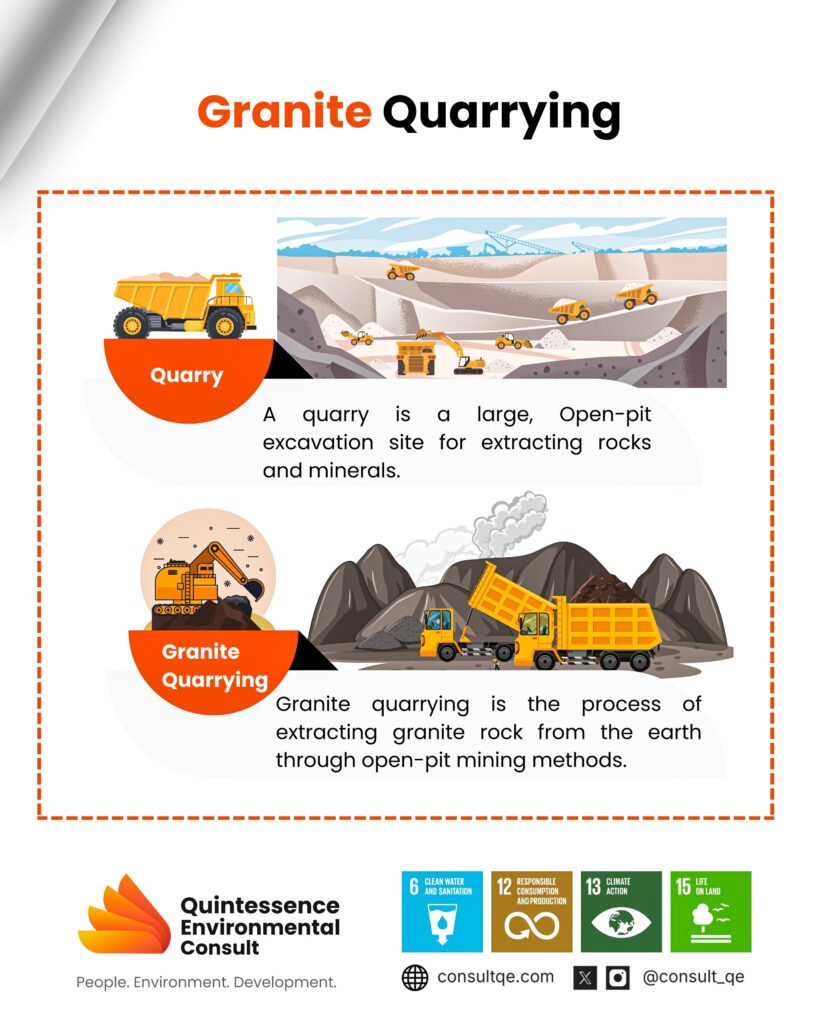
INTRODUCTION
A quarry is a large, open excavation site on the earth’s surface where natural resources like stone/rock, gravel, sand, or minerals are extracted. Granite is a hard, coarse-grained igneous rock composed mainly of quartz, feldspar, and mica. It forms naturally when molten magma slowly cools and solidifies deep beneath the Earth’s surface.
Granite quarrying is the process of extracting granite rock from the earth through open-pit mining methods. For many years, it has served as an important source of construction materials supply, employment and revenue, especially in developing countries like Nigeria, which are endowed with abundant granite deposits. Nigeria’s vast granite reserves have long fueled its construction and mining industries. From road construction to building skyscrapers, granite is an essential raw material. However, behind this booming industry lies a dark reality: illegal granite quarrying is wreaking havoc on the environment, leading to various impacts such as deforestation, soil erosion, water pollution, and air contamination. This article explores the environmental cost of illegal granite quarrying in Nigeria, shedding light on the consequences, key case studies, and the urgent need for sustainable mining practices.
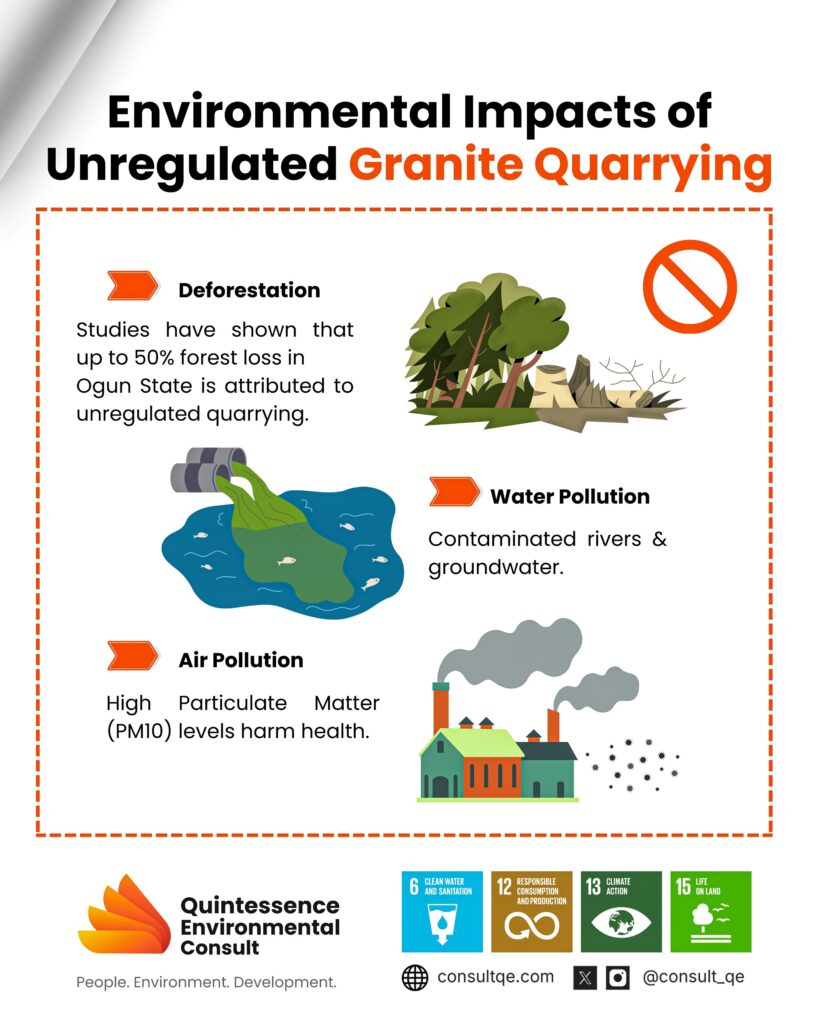
UNDERSTANDING ILLEGAL AND UNREGULATED GRANITE QUARRYING IN NIGERIA
Illegal quarrying refers to the unauthorized extraction of granite without government approval, environmental impact assessments, and adherence to mining regulations. Many of these operations are run by small-scale miners or criminal syndicates, often exploiting rural communities for labour. The lack of oversight means these quarries operate recklessly, leading to widespread environmental degradation.
Abeokuta city in Ogun State, for example, known for its abundant granite resources, is flourishing with illegal quarrying, which has caused significant health and environmental damage. A study by Oguntoke Olusegun (2009) shows that granite quarrying in Abeokuta has led to elevated levels of suspended particulate matter (PM10), posing serious health risks to nearby residents and quarry workers. Common issues include nasal infections, asthma, cough, and sinusitis.
Similarly, in the Federal Capital Territory (Abuja) and its surrounding areas, rapid urbanization has increased demand for granite, leading to uncontrolled quarrying activities in areas such as Mpape 6, which threaten both the environment and local communities.
Another example is granite quarrying in Edo North, Nigeria, where daily activities such as drilling, blasting, crushing, and transporting materials have a significant impact on the environment. These operations contribute to air and noise pollution, water contamination from runoff, and land degradation. With multiple active quarries per community, a study by Okolie K. C. 2021 confirms that quarrying practices have adverse environmental impacts.
In Afikpo, Ebonyi State, the environmental impact of rock quarrying goes beyond just the physical destruction of the land. It also affects the quality of air and water in the area. The dust and debris from the quarrying process can contaminate the air and water, making them unsuitable for human consumption 3.
ENVIRONMENTAL CONSEQUENCES OF ILLEGAL AND UNREGULATED GRANITE QUARRYING
- Deforestation and Habitat Loss
Illegal quarrying often requires clearing large tracts of land, leading to deforestation. The loss of vegetation disrupts ecosystems, endangers wildlife, and contributes to climate change. A study by Adedeji et al. (2020) in Odeda, Ogun State, observed a significant decline in light forest cover from 637.28 hectares in 1984 to 326.52 hectares in 2014, attributed to quarrying activities. This represents nearly a 50% reduction over 30 years. Similarly, Akanwa et al. (2017) reported a 35.2% vegetation cover loss in Ivo Local Government Area, Ebonyi State, due to intensive quarrying operations.
- Soil Erosion and Land Degradation
The process of quarrying begins with the removal of vegetation and topsoil. In legal operations, this is done with care and often includes plans for rehabilitation. However, illegal quarrying strips the land bare without any concern for restoration. Once the protective topsoil is gone, the land becomes exposed to wind and water erosion. This leads to the rapid washing away of soil nutrients essential for farming and biodiversity.
Several communities have watched their fertile lands slowly transform into barren, rocky outcrops. Quarry pits are left open and untreated, turning into erosion channels and death traps. Rainfall accelerates this degradation, creating gullies and reducing the land’s capacity to support crops or vegetation.
- Water Pollution and Scarcity
During quarrying, overburden removal, drilling, blasting, and rock crushing release large volumes of silt, dust, and chemicals into the environment. Without proper drainage or containment systems, runoff from quarry sites flows into nearby rivers, streams, and groundwater sources. This runoff carries fine particles, heavy metals, and sometimes explosive residues, which degrade water quality and harm aquatic ecosystems.
In many rural communities that rely on surface and shallow groundwater for drinking, washing, and farming, this pollution leads to outbreaks of waterborne diseases, loss of fish populations, and reduced access to safe water. The disruption of natural drainage patterns also reduces groundwater recharge, intensifying water scarcity during dry seasons.
- Air Pollution and Public Health Risks
One of the most visible effects of illegal quarrying is the release of large amounts of dust and particulate matter (PM10) into the air. This occurs during blasting, crushing, and the constant movement of heavy trucks. Without dust control systems like sprinklers or barriers, standard in regulated sites, these pollutants are freely dispersed into nearby communities.
Residents living close to unregulated quarry sites often report respiratory problems, including chronic cough, catarrh, asthma, and nasal infections. Quarry workers are even more exposed, suffering from sinusitis and long-term lung conditions due to prolonged inhalation of fine particles. In places like Abeokuta, studies have shown that particulate matter levels near some quarry sites exceed safe limits by several magnitudes5.
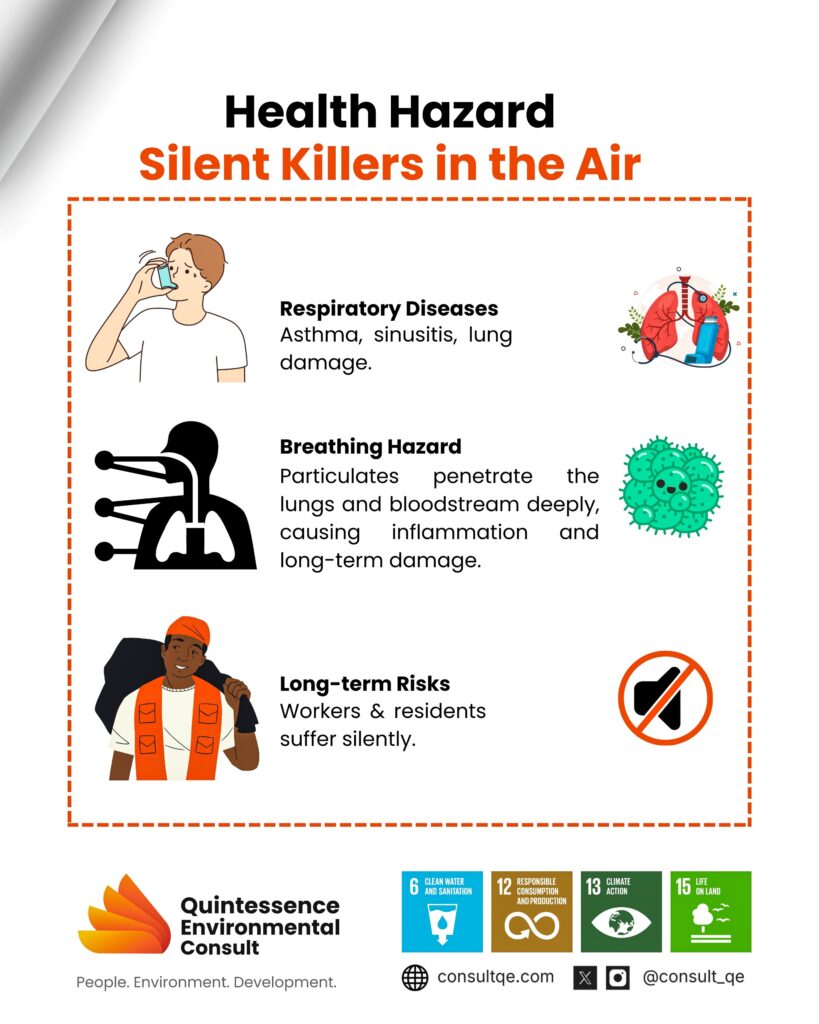
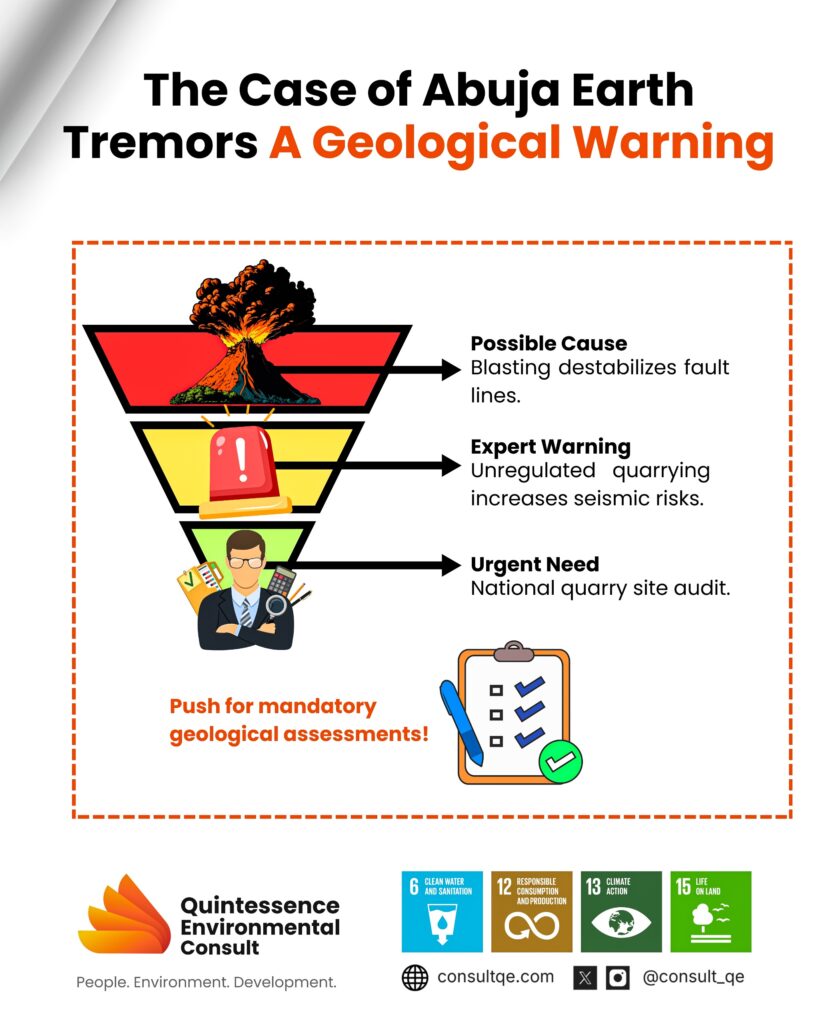
ABUJA EARTH-TREMORS: A WAKE-UP CALL ON THE DANGERS OF ILLEGAL AND UNREGULATED GRANITE QUARRYING
The earth tremors experienced in some parts of Abuja have reignited public concern over the long-term environmental and geotechnical impacts of unregulated quarrying activities in the Federal Capital Territory (FCT). The nature of these tremors raises red flags, suggesting a possible link to continuous granite extraction and the use of explosives in nearby illegal quarries.
Experts in geophysics and environmental geology have warned that uncontrolled blasting can induce stress in underlying rock formations, potentially reactivating dormant fault lines. In the absence of proper geological assessments and environmental compliance, such activities destabilise the subsurface structure and increase the likelihood of minor seismic occurrences. These are not mere speculations; they are backed by empirical data and the observable increase in vibration reports from residents in quarry-prone areas.
The Abuja tremors, therefore, serve as a stark reminder of the hidden costs of ignoring environmental regulations. They highlight the urgent need for a national audit of quarrying sites, strict enforcement of licensing procedures, and a comprehensive environmental impact assessment before any excavation begins. Without this, the capital and indeed, other parts of the country, may continue to experience avoidable geological disturbances with potentially severe consequences.
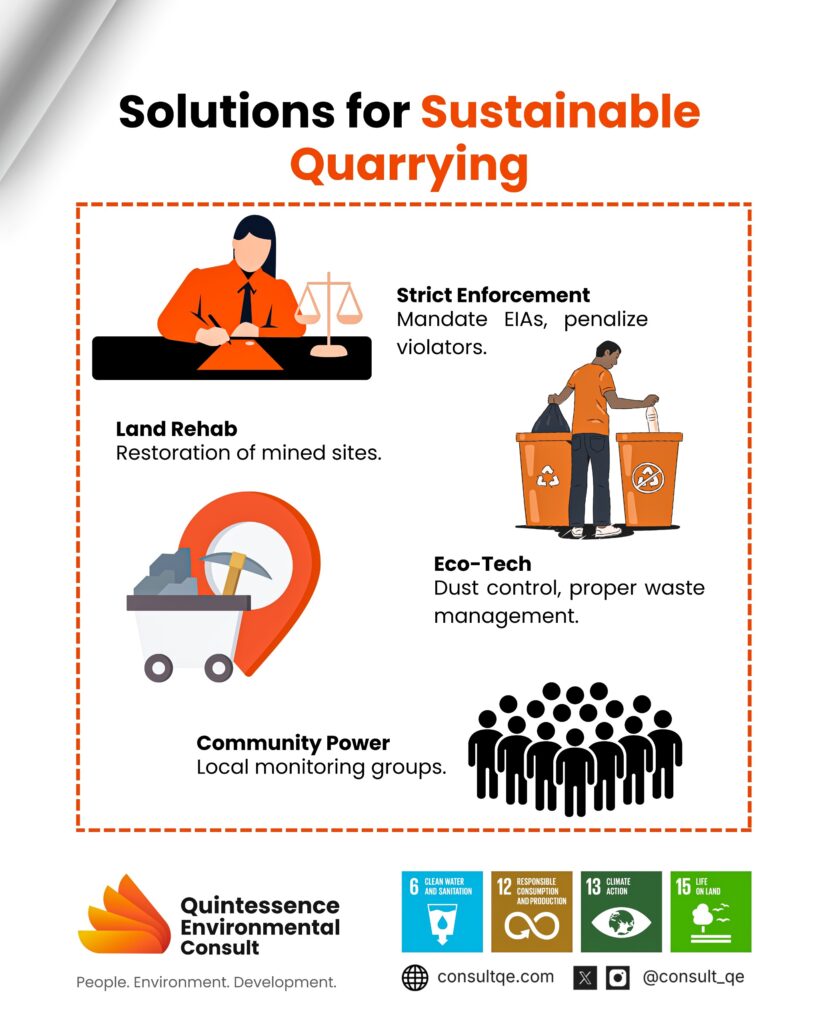
- Approval for quarry operation should mandate environmental impact assessment and ensure strict implementation of outlined mitigation measures to guarantee environmental sustainability.
- Authorities must intensify monitoring efforts and penalize illegal operators.
- Quarry sites should undergo rehabilitation to restore degraded lands.
- Empowering local communities to report and prevent illegal quarrying activities can be an effective strategy.
- Investing in eco-friendly quarrying techniques can reduce environmental damage.
CONCLUSION Illegal granite quarrying in Nigeria is a silent crisis with severe environmental and socio-economic consequences. The impact is far-reaching, from deforestation, water pollution, to air contamination and land degradation. One of the biggest issues is the lack of monitoring. No environmental impact assessments are carried out, no emission limits are enforced, and no safety protocols are followed. This leaves communities to fend for themselves, often unaware of the long-term health risks they are exposed to daily. Tackling this issue requires a multi-faceted approach that includes stringent regulations, environmental rehabilitation, and community engagement. Only through sustainable quarrying practices will Nigeria protect its natural resources and ensure a healthier environment for future generations.

CALL TO ACTION
Tackling the environmental crisis of illegal and unregulated granite quarrying requires more than policy, it demands people. Citizens must actively protect their environment by reporting illegal activities, supporting local watchdog groups, and demanding accountability from private operators and regulatory bodies. Community-led advocacy, environmental education, and grassroots monitoring can amplify efforts toward sustainable quarrying.
- Adedeji, O. H., Olayinka, O. O., Tope-Ajayi, O. O., & Azeez, O. I. (2020). Land use/Land cover changes due to Quarrying in Odeda Local Government Area of Ogun State, Nigeria: An Assessment and Implications for Rural Livelihood. Journal of Meteorology and Climate Science, 18(1), 28-40.
- Akanwa O, A., Onwuemesi E, F., Chukwurah O, G., & Officha C, M. (2016). Effects of Open-Cast Quarrying Technique on Vegetation Cover and the Environment in South-Eastern Nigeria. American Scientific Research Journal for Engineering, Technology, and Sciences, 21(1), 227–240. Retrieved from https://asrjetsjournal.org/index.php/
American_Scientific_Journal/article/
view/1746 - Chijioke, N. M., Nnenna, E., Ozobialu Benedicta, C., Peretomode, E., & Chibuzo, N. J. (2024). Environmental impacts of rock quarrying at the Afikpo quarry sites, Ebonyi state, southeastern Nigeria. The Asian Review of Civil Engineering, 13(2), 45-54. https://doi.org/10.70112/tarce-2024.13.2.4245
- Okolie K.C, Mbamali. I, Elamah D. (2021). ASSESSMENT OF THE NATURE AND CHARACTERISTICS OF GRANITE QUARRYING SITES IN EDO NORTH NIGERIA. International Research Journal of Modernization in Engineering Technology and Science, 03(082021
- Olusegun, O., Adeniyi, A., & Adeola, G. T. (2009). Impact of granite quarrying on the health of workers and nearby residents in Abeokuta, Ogun State, Nigeria. Ethiopian journal of environmental studies and management, 2(1).
- Omosanya, K. O., & Ajibade, O. M. (2011). Environmental impact of quarrying on Otere village, Odeda, Southwestern Nigeria. Ozean J Appl Sci, 4(1), 75-82.

